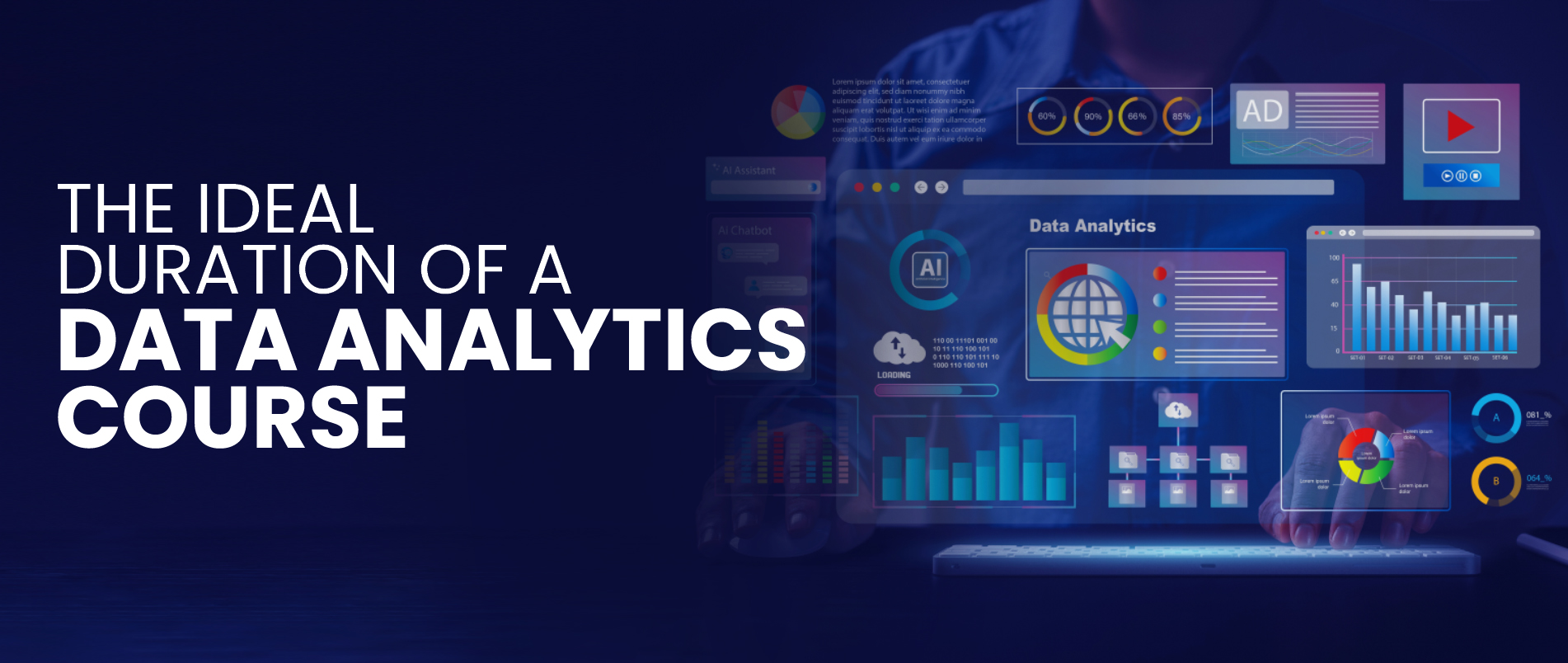In this data-driven interconnected age, data analytics plays an important role in helping businesses offer their customers the best products and services. This makes a career in data analytics highly lucrative in the IT industry. Becoming a data analyst enables you to have a successful career in IT without requiring programming or coding knowledge.
With over 1 lakh + job openings, and over 70% of them looking for freshers, getting into the field of data analytics is the right choice to start your career.
But, where do you start? A data analytics course is an obvious answer.
As a fresher, you will have seen multiple options for data analytics courses, but each one has a different duration.
- Short Program (1-3 Months): Bootcamps, Self-Paced Courses, and Specialised Certifications often promise to get you certified and job-ready within 1-3 months. They often focus on only the commonly used tools and technologies (e.g. Excel, Tableau, or Power BI) and avoid hands-on learning methods that help in understanding the theory from a practical standpoint.
- Comprehensive Program (6-12 Months): Most comprehensive courses in data analytics range between 6 and 12 months. These courses encapsulate a wider range of topics (e.g. Python and R programming, MySQL, Data Visualisation techniques, etc) compared to the short programs and also include hands-on assignments for practical learning.
- Longer Programs (12+ Months): A few postgraduate diploma programs or master's degrees in data analytics extend beyond 12 months. These courses are primarily aimed at students who want to stay in the academic world and continue on to research or a PhD in this domain.
So, how long does a data analytics course ideally take?
Even though short programs might seem to be the fastest way to get certified, they lack the comprehensive understanding and practical exposure that is needed for a career in data analytics in the IT field. Is 3 months enough to learn data analytics? The short answer is no. For a holistic educational experience, the data analytics course needs to be longer than 3 months.
Most industry experts and professionals agree that the ideal duration of data analytics courses is 6-months. Here's why:
- Depth of Curriculum: A course longer than 6-months allows students to have a better understanding of essential tools, including Python, R, MySQL, Excel, and Data Visualisation tools. These courses provide enough time to comprehensively understand the theoretical foundations of data analysis, data cleaning, statistical concepts, and machine learning basics in a manner that is not rushed or overwhelming.
- Real-world Projects: Exposure to practical applications is vital to get into the field of data analytics. A 6-month-long course will often offer multiple real-world assignments and a few capstone projects, which allow you to gain practical experience while building a comprehensive portfolio for showcasing to potential employers.
- Concept Clearing: New concepts take time to get accustomed to. A 6-month period allows for thorough learning and doubt-solving sessions with mentors, even at later stages when applying theoretical concepts to assignments and projects. This allows for practice, reinforcement, and the development of problem-solving skills.
- Industry Alignment: Most data analytics courses have an industry-aligned duration of 6-months, which is sufficient training for an entry-level data analytics role without prolonging academic commitment.
Why specifically 6-months?
Let's try to understand why the ideal duration of data analytics courses is just 6-month by taking a look at the different modules covered in the curriculum and the time taken to cover them:

- Microsoft Excel: The minimum duration required to cover Excel is 30 hours. A typical weekday class duration is 2 hours, which means it will take at least 15 days to cover Excel completely. Presentations by industry experts and students will take up at least 3 days at various stages of module completion. Thus, the minimum total duration to completely cover Microsoft Excel will be ~18 days.
- MySQL: The minimum duration required to cover MySQL is 30 hours, which means it will take at least 15 days to complete the coverage of MySQL. Presentations will take up at least 2 days. Thus, the minimum total duration to completely cover MySQL will be ~17 days.
- Tableau: The minimum duration required to cover Tableau is 20 hours, which means it will take at least 10 days to complete the coverage of Tableau. Presentations will take up at least 2 days. Thus, the minimum total duration to completely cover Tableau will be ~12 days.
- Power BI: The minimum duration required to cover Power BI is 30 hours, which means it will take at least 15 days to complete the coverage of Power BI. Presentations will take up at least 3 days. Thus, the minimum total duration to completely cover Power BI will be ~18 days.
- Python: The minimum duration required to cover Python is 16 hours, which means it will take at least 8 days to complete the coverage of Python. Presentations will take up at least 1 day. Thus, the minimum total duration to completely cover Power BI will be ~9 days.
- Business Statistics: The minimum duration required to cover Business Statistics is 8 hours, which means it will take at least 4 days to complete the coverage of Business Statistics.
- Basics of R: The minimum duration required to cover Basics of R is 6 hours, which means it will take at least 3 days to complete the coverage of Basics of R.
If we calculate the minimum total duration required to cover all these modules, it adds up to ~81 days.
Now, if we consider a week to be 5 working days, it will take at least 16 weeks or ~4 months to cover the theory classes and presentations.
If we add in roughly 1 week for a single real-world assignment or capstone project for each of the modules, that will add another 7 weeks to the 4 months, bringing us to the ideal duration required by a data analytics course ~ 6-months.
So, the realistic timeline for a data analytics course is a minimum of 6-months.
Why Choose ExcelR for your Data Analytics Course?
If you compare data analytics courses provided by different institutions, ExcelR stands out with a comprehensive curriculum that's wrapped up in the ideal duration of 6-months.

Here are some of the distinct advantages of ExcelR's course:
- Comprehensive Curriculum: ExcelR's curriculum comprehensively covers the required core skillsets in MySQL, Microsoft Excel, Tableau, Power BI, and fundamentals of R and Python, along with five free value-added courses.
- Focus on Hands-on Learning: Unlike short programs that often skip over practical exposure, ExcelR puts an emphasis on hands-on learning with 60+ real-world assignments and capstone projects.
- 1-1 Assignment Support: Unlike many courses, ExcelR provides a dedicated 1-on-1 assignment support to help you comprehensively understand and complete the assignment through their dedicated assignments team. This team is accessible on calls, WhatsApp, and even Google Meet.
- Jumbo Pass: ExcelR's data analytics course also includes a complimentary offering called Jumbo Pass. With Jumbo Pass, you can attend unlimited live-virtual classes for one year from the course start date, and get lifetime access to all pre-recorded sessions, which are updated regularly. This ensures that you can keep up with changes and updates in all the major tools and technologies required to be a successful data analyst.
- Placement Assistance: ExcelR's data analytics course comes pre-included with placement assistance, which includes interview preparation from day-1, mock interview preparation, LinkedIn profile optimisation, resume building session, and placement opportunities with 5000+ hiring partners.
- Industry Recognition: ExcelR's program includes industry-recognised certification in association with NASSCOM FutureSkills Prime and premier IITs, which adds significant value to your resume.
- Realistic Timeline: The 6-months that this course spans across is carefully selected, curated, and presented to provide a realistic learning experience. With this duration, the course ensures that you are neither rushed through theoretical modules nor finish real-world assignments without a deep understanding of the concepts and hands-on experience. It also makes sure that you do not waste any extra time before starting your career.
Conclusion
In conclusion, even though short programs appear to be more tempting with their smaller duration of less than 3-months, as we have outlined, the ideal duration for a comprehensive data analytics course needs to be at least 6-months. These 6-months are necessary to attain the perfect balance of depth of knowledge, practical application, and job readiness. If you're still not sure about the duration that works for you, why not get a free 1-on-1 career counselling session?











